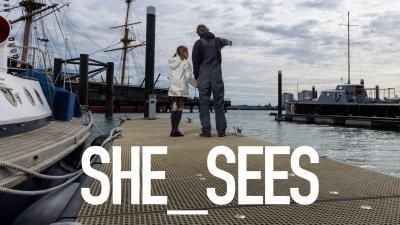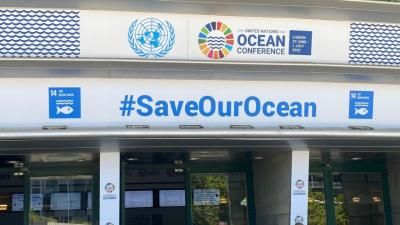
Landmark SHE_SEES exhibition comes to Portsmouth
After its launch at last year’s London International Shipping Week, our SHE_SEES exhibition is opening at the Portsmouth Historic Dockyard.
This page is approximately a 4 minute read
This page was published on

The UN Ocean Conference was held between Monday 27 June – Friday 1 July in Lisbon. Co-hosted by the Governments of Kenya and Portugal, the event set out to mobilise action to ensure a safe and sustainable future for our oceans through championing science-based solutions, innovative thinking and international collaboration.
The conference is the biggest global meeting of ocean decision-makers with representation from government, big business, research, academia and NGOs. Notable attendees at this year’s event include Emmanuel Macron, President of France (pictured below with Foundation-secondeee Vincent Doumeizel), and the Secretary-General of the United Nations, Antonio Guterres.
Lloyd’s Register Foundation was directly involved in several official side events.'Safety, equity and sustainability from source to sea' was delivered with the United Nations Global Compact (UNGC), Accenture, HUB Ocean, Stockholm resilience centre and Stockholm International Water institute, while an exclusive premiere of Lloyd’s Register Foundation’s Safer Oceans documentary-film 'Two Kinds of Water' was shown with a panel consisting of representatives from WEF (Friends of Ocean Action), the UN Food and Agriculture Organisation (FAO), WorldFish, Environmental Defense Fund (EDF) and the Environmental Management and Economic Development Organization (EMEDO). The Foundation also partnered with grantholder, the Safe Seaweed Coalition to deliver the official side event ‘Seaweed: a revolution to achieve SDG 14 and more’.
'Safety, equity and sustainability from source to sea' was a discussion about the barriers, opportunities and innovative approaches to science based and data-fuelled collaborations in the ocean space.
‘Two Kinds of Water’ is a documentary produced by award winning journalist and director Dan McDougall, highlighting the safety challenges faced on a daily basis by small scale fishers in Senegal, West Africa.
The Safe Seaweed Coalition event explored the multiple contributions of seaweed to achieving the targets of SDG 14 and it’s relevance to other SDGs, describing the progress to date and identifying next steps required.
Many of the Foundation’s global grants community had a presence throughout the conference, including several events ran by United Nations Global Compact and UN Food and Agriculture Organisation (FAO) – who were championing the Foundation’s mission of protecting physical and mental wellbeing for those that live and work at sea.
Ruth Boumphrey, Lloyd’s Register Foundation CEO, says: “The UN Ocean Conference provided valuable insight into maritime as a large complex system – from ports to finance to energy systems, and from island states to inland nations. We also heard how it could pave the way for systemic change as the wider ocean economy grows and as the world decarbonises. Lloyd’s Register Foundation will ensure safety is at the heart of these dialogues, and that the wellbeing of all those who work at sea is protected. We’re looking for partners who value safety to build effective action towards the next UN Ocean Conference in 2024.”
Tim Slingsby, Director of Skills and Education at Lloyd’s Register Foundation, says: “The spirit of collaboration felt between governmental agencies, private sector organisations and charities/NGOs was a key moment of encouragement throughout the UN Oceans Conference. This was emphasised through the presence of Small Island Developing States (SIDS) – whose very existence is dependent on effective management and stewardship of our ocean. It is clear that our oceans are in crisis, and those that have the biggest stake in safe outcomes for our oceans should have more influence. Building capacity for safe ocean engineering will be a critical factor in ensuring sustainable, healthy oceans.”
Jan Pryzdatek, Director of Technologies at Lloyd’s Register Foundation, says: “My main takeaway from many conversations over the course of the conference is that green corridors and sustainable shipping are a growing strategic priority for many organisations and governments around the world. Yet there are many stakeholders across the globe that are yet to engage, some of which simply do not know how. With Lloyd’s Register’s rich maritime history, we have an opportunity to build coalitions and collectively upscale this nascent industry safely and sustainably.”